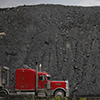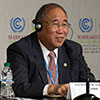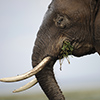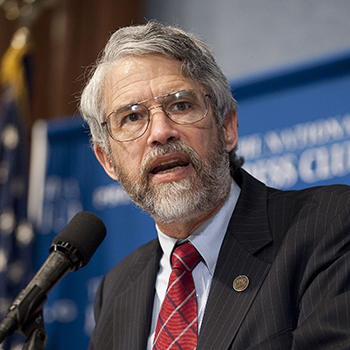
Report
by jim o'donnellA flood of migrants from the Middle East and Africa has prompted governments in the Balkans to erect hundreds of miles of border fences. Scientists say the expanding network of barriers poses a serious threat to wildlife, especially wide-ranging animals such as bears and wolves.
Comments | READ MORE

Dispatch
by emma bryceFrom Morocco to Libya, the desert oases of the Sahara's Maghreb region are disappearing as temperatures rise and rainfall decreases. Facing daunting odds, local residents are employing traditional water conservation techniques to try to save these ancient ecosystems.
Comments | READ MORE

Opinion
by james van nostrandPresident-elect Donald J. Trump has vowed to revive U.S. coal production and bring back thousands of jobs. But it’s basic economics and international concern about climate change that have crushed the American coal industry, not environmental regulations.
Comments | READ MORE

Report
by fred pearceGlobal businesses are increasingly pledging to obtain key commodities only from sources that do not contribute to deforestation. Now, nonprofit groups are deploying data tools that help hold these companies to their promises by tracing the origins of everything from soy to timber to beef.
Comments | READ MORE
Report
 by jim robbins
Research on stoneflies in Glacier National Park indicates that global warming is reducing the genetic diversity of some species, compromising their ability to evolve as conditions change. These findings have major implications for how biodiversity will be affected by climate change.
Comments | READ MORE
by jim robbins
Research on stoneflies in Glacier National Park indicates that global warming is reducing the genetic diversity of some species, compromising their ability to evolve as conditions change. These findings have major implications for how biodiversity will be affected by climate change.
Comments | READ MORE

Analysis
by isabel hiltonWith Donald Trump threatening to withdraw from the Paris Agreement, China is ready to assume leadership of the world’s climate efforts. For China, it is a matter of self-interest – reducing the choking pollution in its cities and seizing the economic opportunities of a low-carbon future.
Comments | READ MORE

Report
by ed struzikRussia, China, and other nations are stepping up preparations for the day when large numbers of cargo ships will be traversing a once-icebound Arctic Ocean. But with vessels already plying these waters, experts say the time is now to prepare for the inevitable environmental fallout.
Comments | READ MORE

Analysis
by david victorDonald Trump’s ascension to the presidency signals an end to American leadership on international climate policy. With the withdrawal of U.S. support, efforts to implement the Paris agreement and avoid the most devastating consequences of global warming have suffered a huge blow.
Comments | READ MORE

Forum
Few groups were as shocked and chagrined by Donald Trump’s victory as the environmental community. Yale Environment 360 asked environmentalists, academics, and pro-business representatives just how far Trump might roll back President Obama’s environmental initiatives.
Comments | READ MORE

Report
by heather millarFrom rapid genetic analysis to spectrography, high-tech tools are being used to track down and prosecute perpetrators of the illegal wildlife trade. The new advances in forensics offer promise in stopping the trafficking in endangered species.
Comments | READ MORE

Report
by roger real drouinA steady increase in sea levels is pushing saltwater into U.S. wetlands, killing trees from Florida as far north as New Jersey. But with sea level projected to rise by as much as six feet this century, the destruction of coastal forests is expected to become a worsening problem worldwide.
Comments | READ MORE

From Obama’s Chief Scientist,
Parting Words of Caution on Climate
John Holdren is the longest-serving presidential science adviser in U.S. history and probably one of the most influential,

John Holdren
having advised President Obama on key energy issues for the last eight years. A physicist by training, Holdren was among the chief architects of the Obama administration’s Climate Action Plan. The plan has been lauded by environmentalists, but is loathed by conservative politicians, some of whom have filed suit against it. Holdren spoke with
Yale e360 contributing writer Elizabeth Kolbert about the difference between “dangerous” and “catastrophic” warming, the incoming Trump administration, and how to talk to people who deny the existence of climate change. “Part of the reason that I retain some optimism about the future is that there are these fundamental forces pushing us toward doing the right thing,” he said.
Read the interview.The Obama administration finalized a rule on Monday that
strengthens protections for rivers, streams, and forests near coal mining facilities —

Coal waste downstream of a mine in Kentucky.
the first update to the Interior Department regulations in 33 years. The tougher guidelines require companies to avoid mining practices that could pollute streams and drinking water sources, as well as restore waterways and landscapes to their original state once mining is complete,
according to Reuters. The Interior Department said the updated Stream Protection Rule would safeguard 6,000 miles of waterway and 52,000 acres of forest over the next two decades. It is likely to be one of the Obama administration’s last major environmental actions before leaving office, and one of President-elect Donald Trump’s earliest targets after inauguration. Trump has pledged to
rebuild the U.S. coal industry, saying on the campaign trail that he
would repeal any update to the stream protection rule if elected.
Interview: Unusually Warm Arctic
May Have Impact on Global Weather
This year will almost certainly go down as the warmest on record in the Arctic, with autumn temperatures soaring 36 degrees F above historic norms.

Jennifer Francis
Among the climate scientists attempting to make sense of the rapid changes sweeping the Arctic is Jennifer Francis of Rutgers University. Francis has propounded the widely discussed theory that swiftly rising temperatures in the Arctic, which are closely intertwined with the loss of sea ice, are changing the shape of the jet stream and altering the weather of the northern hemisphere. In an interview with
Yale Environment 360, Francis explains why large portions of the Arctic are experiencing temperatures more typical of New York City and warns that we ignore climate upheaval at the North Pole at our own peril. "The speed of the change is what is very disturbing to me," says Francis, "because it's such an indicator of what's happening to the planet as a whole."
Read the interview.
Scientists at NASA have created a striking
new video animation that shows exactly how carbon dioxide moves through the atmosphere

The movement of CO2 across the globe.
and across the globe — helping better explain how much CO2 stays in the atmosphere after being emitted, how long it stays there, and where it goes. That information, said NASA carbon cycle scientist Lesley Ott, will help improve researchers’ understanding of future climate change. The new 3-D visualization uses more than 100,000 measurements of CO2 taken daily from September 2014 to September 2015. It shows the rise and fall of CO2 throughout the seasons, the influence of geological structures like mountains, and the impact of highly productive ecosystems like the corn belt in the U.S. “There's still a long way to go, but this is a really important and necessary step in that chain of discoveries about carbon dioxide,” said Ott.
Interview: Are Trees Sentient?
Certainly, Says German Forester
In his bestselling book,
The Hidden Life of Trees, German forester Peter Wohlleben argues

Peter Wohlleben
that to save the world’s forests from climate change and other threats we must first recognize that trees are “wonderful beings” with innate adaptability, intelligence, and the capacity to communicate with — and heal — other trees. In an interview with
Yale Environment 360, Wohlleben discusses how trees live in families, have an inborn memory of events like previous droughts, and possess the capacity to make decisions and fight off predators. Wohlleben has been criticized for anthropomorphizing trees, but he maintains that to succeed in preserving our forests in a rapidly warming world, we must start to look at trees in an entirely different light.
Read the interview.Scientists in the U.S., aided by colleagues in Canada and elsewhere, are moving quickly
to preserve climate data stored on government computer servers out of concern that the Trump administration might remove or dismantle the records. A “
guerrilla archiving” event will be held at the University of Toronto this weekend to catalog U.S. government climate and environmental data. Other researchers from the University of California to the University of Pennsylvania are responding to calls on Twitter and the Internet to preserve data on everything from rising seas to wildfires. The actions come as President-elect Donald Trump has appointed climate change skeptics to all his top environment and energy posts. Though there has been no mention yet of removing publicly available data, “it’s not unreasonable to think that they would want to take down the very data that they dispute,” said Michael Halpern of the Union of Concerned Scientists.

Yale Environment 360 is
a publication of the
Yale School of Forestry
& Environmental Studies.


About e360
Contact
Submission Guidelines
Reprints
 Yale Environment 360
Yale Environment 360 articles are now available in Spanish and Portuguese on
Universia, the online educational network.
Visit the site.
Opinion
Reports
Analysis
Interviews
Forums
e360 Digest
Podcasts
Video Reports
Biodiversity
Business & Innovation
Climate
Energy
Forests
Oceans
Policy & Politics
Pollution & Health
Science & Technology
Sustainability
Urbanization
Water
Antarctica and the Arctic
Africa
Asia
Australia
Central & South America
Europe
Middle East
North America

A look at how acidifying oceans could threaten the Dungeness crab, one of the most valuable fisheries on the U.S. West Coast.
Watch the video.
The latest
from
Yale
Environment 360 is now available for mobile devices at
e360.yale.edu/mobile.

An aerial view of why Europe’s per capita carbon emissions are less than 50 percent of those in the U.S.
View the photos.

An indigenous tribe’s deadly fight to save its ancestral land in the Amazon rainforest from logging.
Learn more.

An
e360 video series looks at the staggering amount of food wasted in the U.S. – a problem with major human and environmental costs.
Watch the video.

Residents of the Chocó Rainforest in Ecuador are choosing to plant cacao over logging in an effort to slow deforestation.
Watch the video.

Tribal people and ranchers join together to stop a project that would haul coal across their Montana land.
Watch the video.





























